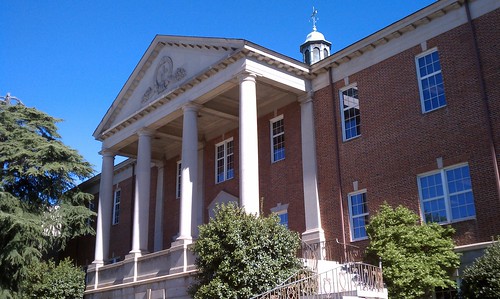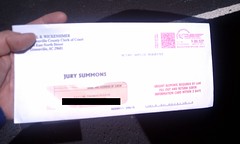A couple of weeks ago this nice little letter from Paul Wickenseimer, Clerk of Court for Greenville County, arrived in my mailbox…
Yep, a jury summons. I was to start my round of civic duty April 4. I just completed it, and it was an interesting, yet unfulfilling experience.This was my first time up for county court. I had been summoned by magistrate court, but as soon as I put down my occupation as a teacher, I would be dismissed from the pool. A couple of years ago I was called up to serve on a high-profile murder case. I was able to argue a connection (albeit very tenuous) between the victims and my former college roommate, so I was dismissed from that case. Good thing – they sequestered the jury for a couple of weeks, and we were going on vacation the week after I had been called up. This time there was no escape. As an educator I could have had service deferred until summer, but I preferred to just get it over with.
As I arrived for my first day of duty we all shuffled with some confusion through the security scanners at the court house. It was fairly easy to distinguish between the jurors and those with other business before the court. One young man was wearing a suit, but it was painfully obvious that wasn’t his normal attire. To make matters worse, tattooed across his neck was the phrase “Only God can judge me.” Not smart, if you have to appear in court.
I know the process is different for each county, but here’s how it worked for us…
A large contingent of us were ushered into the large jury assembly room. To get things started, Paul Wickenseimer himself greeted us. We were given some instructions by the jury coordinator, Judy Olson, then we were shown a short video explaining the process.
A judge came in along with a whole herd of attorneys. We were sworn in, then asked to stand as our names were called and state our occupation and our spouse’s occupation. I watched the lawyers scribbling furiously as we went through this process.
Next came the exemptions. Anyone over 65 was not required to stay (although all did.) There were some that claimed hardship – some were excused, others not. It was interesting to watch the expressions of those that really didn’t want to be there, and how they were scheming to get OUT of duty.
I was in the first group to be called up. We trudged to the top floor of the courthouse for a criminal case involving sexual assault. When it came my turn, the prosecutor wanted me seated, but the defense had me excused. This was to be a pattern repeated all week.
In all, I was called up for one civil case and two more criminal cases. I was rejected by the defense each time. On the last day we stood outside the court room for about 30 minutes waiting to go in for a criminal case. I knew exactly what was happening – the threat of a jury was being used to get the case settled, and it worked. Either the defendant changed a plea, or something else happened. Whatever it was, we were told we were no longer needed, and dismissed back to the assembly room.
As it turns out, I didn’t serve on a single jury, but I spent LOTS of time hanging out in the jury assembly room. If I was going to have the disruption of jury duty, I think I would have enjoyed at least one interesting case. Fortunately, they allowed us to have cell phones and laptops in the assembly room, so I was able to get some work done.
There was one woman who was a former policeman, and several others related to law enforcement officers. These were never seated on juries, either. I guess I, as a school administrator, was seen by the defense as an authority figure, and wouldn’t be sympathetic to a criminal defendant.
The former policeman made some disparaging comment about “profiling” and how that doesn’t tell whether a person would really be objective in a case. I know I could (despite seeing weird tattoos) because I believe I could base any decision on the evidence presented, and nothing more. However, an attorney doesn’t have the luxury of doubt. They need to eliminate any possible bias against their client.
Many years ago, before I started teaching, I was toying with the idea of law school. I actually worked for a year for a large law firm in Greenville as a courier/clerk. One of my duties was keeping track of information on potential jurors. This was before the days of databases, so the information was kept on 3X5 index cards that I had to file. It always amazed me the amount of information they had on individuals, such as how much they made, political leanings, etc., etc. I knew that a private investigate was often engaged to gather this information, most of which was public information, but just had not been gathered together. The concept of “data mining” and user profiling hadn’t been invented, so seeing all of that information together could be a shock.
Today, the task is much easier, especially with access to online databases. Even without access to official resources, with social media, etc., we leave behind some fairly large digital footprints that could provide insight into a juror’s biases. I can’t help but wonder if some investigator has gone over this blog, my photos, my Twitter account, and put together a profile on me. It would be interesting to know what they found.


I’m glad you wrote about your experience. I was curious to compare it to my time as a juror in Pickens county.
Didn’t you used to serve subpeonas or something? I seem to remember a firearm somewhere in the mix.
I’m in the middle of it right now. So far I’ve been shuffled into three court rooms, in between hours of waiting, two criminal, one civil. All three times. my juror number wasn’t even called so they could agree to put me on the jury or excuse me. AND this is only day two of five…. ugh!